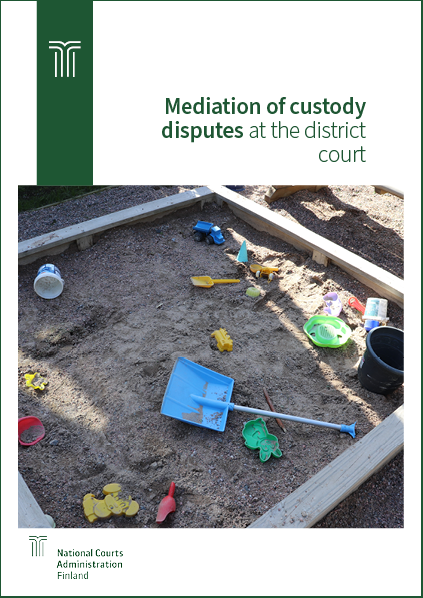Expert-assisted mediation of custody disputes at the district court
Court mediation is an alternative to a long and often strenuous trial in custody dispute cases. It is a special mediation service that parents may use when the assistance provided within other divorce services has proved to be insufficient.
Questions that may be brought up in the course of mediation are parents' disagreements concerning the custody, living arrangements, right of access and maintenance of a child. In addition, many such matters concerning the everyday life of a child that cannot be handled in a trial may be settled in the mediation. The goal of mediation is that the parents reach a durable agreement that is in the best interests of the child.
The parties may also apply for mediation when court proceedings are already under way. If a matter is taken up for mediation, the trial is suspended until the mediation process has been concluded.
The mediator is a judge acquainted with family matters, and he or she is assisted by an expert in parenting and child development matters, usually a psychologist or a social worker. The mediator judge is a different person than the judge dealing with a custody dispute in court proceedings. This kind of multi-professional working team is capable of supporting the parents in solving both the legal and psychological problems they may encounter in a divorce situation. The purpose of expert assistance is to ensure that questions that are essential with regard to the best interests of the child are handled in the course of mediation and that the settlement reached is in the best interests of the child.
In mediation, a matter is handled in an informal manner through discussion. The parents may engage the services of a legal counsel if they so wish.
Mediation mainly consists of discussions and negotiations conducted with both the parents present, but if need be, the mediator may also discuss with either of the parents in private. The mediator and the expert assistant may also discuss the matter with the child, if this is agreed upon with the parents.
The mediator may confirm an agreement reached in mediation. A confirmed agreement is valid similarly to a court decision and enforceable as such.
Benefits of mediation
A settlement between the parents promotes the well-being of the child and usually helps the child to maintain a relationship with both the parents.
Mediation may be initiated quickly. The mediation session must be held within six weeks from the date of issue of the decision to initiate mediation
Mediation is a faster procedure than a trial. It may require only one meeting to reach an agreement between the parents. If this does not happen, it is possible to proceed gradually and make short-term agreements to try out a certain arrangement before entering into a final agreement.
Mediation is always based on voluntariness. Initiation of mediation requires that both parents consent to it and either parent can terminate the mediation process at any stage.
The mediator may confirm an agreement reached in mediation. A confirmed agreement is valid similarly to a court decision and enforceable as such.
Mediation is an affordable option
A processing charge is charged for mediation. Parents may use the services of an expert assistant assigned by their home municipality free of charge. If the parent hires a legal counsel, he or she shall pay the counsel's fee.
If the parent has been granted legal aid, the expenses of the counsel are paid from State funds. If a parent has been granted legal aid, the expenses for a legal counsel are paid by the State either partially or in full in accordance with the legal aid decision. Legal aid is applied for at the state legal aid offices. Further information on legal aid can be found here.
How is mediation initiated?
Parents may apply for mediation by submitting a free-form application to the district court of the child's municipality of residence. Many district courts also provide specific application forms for this purpose. The application may be filed by the parents jointly or by one of the parents alone. The application must include the parties' names and contact information, the matters to be dealt with in the mediation and a short description of the dispute. Exemplary application forms can be found there.
If the application is filed by one of the parents alone, the district court will ask for the other parent's consent to the mediation, because the commencement of mediation requires the consent of both parents.
The parties may also apply for mediation when court proceedings are already under way. Further information can be obtained from the local district court.

Download brochure Mediation of custody disputes at the district court
in English [pdf, 1.8 Mt]
in Finnish [pdf, 2.1 Mt]
in Swedish [pdf, 2.1 Mt]
in French [pdf, 1.8 Mt]
in Arabic [pdf, 434.7 kt]
in Somali [pdf, 1.8 Mt]
in Russian [pdf, 1.8 Mt]
Published 23.11.2023
